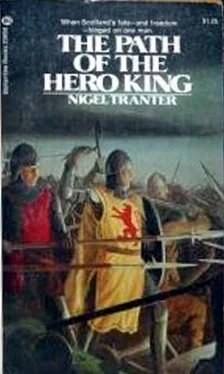There was some low-voiced bickering amongst the Highlanders.
It seemed that the previous killing party were assuming that they would continue with the good work, whereas the others wanted to share in the proceedings. Almost they were coming to blows on the matter. The King had sternly to order peace, and commanded that a new selection of dirk men be given their chance.
The farmhouse itself was small and mean, little better than a cabin; but the associated buildings were quite extensive, barns, stables and byres, for formerly much cattle had grazed on these grassy links Bruce cattle. It was from these outbuildings that the singing emanated, where the troops were presumably quartered. The Kings own party drew their swords this time, and moved close in with the rest of the en circlers in case this proved to be a less tidy exercise.
It did-although the knightly swords were not in fact required. None of the enemy ever actually emerged from the buildings, but the process of elimination was clearly a much lengthier and noisier one, with shouting and yelling, the clash of steel and the crash and tumble of fitments and bodies. This went on at some length, so that Bruce was constrained to detach another couple of score of eager participants from the surrounding cordon, to send them in to aid and speed the work.
He kept glancing over his shoulder, southwards towards the Kirkton,
less than half a mile away. Admittedly all was dark in that direction,
and the blustery wind was from the southwest; but an unholy noise was
undoubtedly arising from Auchenduin steading. At last the racket began
to abate, and the Islesmen to emerge from the buildings. Some few were wounded now, and presently one was carried out dead. But there was no depression, most evidently.
It seemed to have been a thoroughly enjoyable affair for the Moidartach, really more satisfactory than at Maidens Mill; these were of course professional sea-raiders and killers, however addicted to poetry, the sagas, music and dancing. They claimed that there had been all of four-score Englishry in there. None would trouble Scotland again.
This experience convinced Bruce that he was wise to leave the Kirkton
and the Castleton until later. These were villages, or at least
hamlets, with a number of houses, and the danger of noise, disturbance and resistance would be the greater, especially with the local people
there to complicate matters. Much better to pick off the outlying billets first-and according to the fishermen there were still four more of these to account for.
So again ordaining that there was to be no plundering meantime, and that the horses were to be left in their stables, the King divided the company there and then into three parties of approximately a hundred each. Edward, with his overbearing and impetuous nature, did not get on well with others-with men, that is; he did well enough with women usually-was given Gilbert Hay as lieutenant, Hay being a quiet, level-headed but effective man.
They were to deal with another smaller farm-steading to the north, and a second mill on the Morriston Burn. Ninety minutes was all the time they could be spared for this, and they would have the longest distance to travel-so haste was essential. Lennox was sent to watch the castle exits, with Neil Campbell, a hardened fighter, to stiffen him. Their task meantime was to avoid conflict if possible, avoid detection, but to ensure that the English leadership was prevented, if roused, from issuing forth to take charge of the situation.
Bruce himself, with James Douglas, would tackle the castle brewery and the main kennels and falcon-yard. These being both close to the castle walls would demand extra care and quiet. They would all meet again at the Kirkton in about ninety minutes, for a joint attack.
Douglas, who had remained very silent until now, voiced his views to his monarch and hero as they moved off, southwards, with their hundred men.
This is ill employment for a King, as for noblemen, Your Grace, he declared.
I never thought to see the day when I would skulk and steal and slay sleeping men, like any thief in the night.
It is not pretty work, Bruce agreed.
But necessary. How would you order it, Jamie?
I do not know, the other admitted frankly.
I have had but little experience of war. Sir James was just twenty-one, and had spent six years as a refugee in France, with Norman relatives.
Tournaments and jousting had been all his military education.
But surely other than this.
Aye, the King said heavily.
But if you are going to serve me and my cause, lad, you will have to be prepared to soil those white hands of yours. Oh, yes-you have done well as a fugitive in the heather, Jamie. Taken your part and complained nothing. I have watched you. But when ill work fell to be done, anything went less than well with your honour, it was not James Douglas who did it. That I noted also!
The younger man bit his lip and said nothing.
See you-once I thought as you do. But I have learned in a hard school. Eleven years I have been a-learning. I have learned that a nation fights for its very existence cannot always afford the luxury of honour. I have had two stark teachers, Edward of England and William Wallace. For long, the lords of Scotland prevailed nothing against Edward, who cares no whit for honour or chivalry or anything such. Only Wallace knew how to fight Edward. Against the overwhelming might and utter ruthlessness of the Englishman, Wallace alone made headway. He fought no pitched battles, made no knightly sallies, accepted no challenges.
He slew by night, surprised, ambushed, outwitted. He burned a small castle here, took a village there, harried the flanks of armies, cut their supplies, wasted the land before them. And only Wallace did Edward fear. This, Jamie, is Wallaces kind of warfare. And it is the only kind Bruce can afford to wage today.
Since needs must, some must do it, yes, Douglas conceded, But… must the King?
The King? What is the King, man, but the representative and leader of his people? I have thought much of kings and kingship since coronation-day at Scone. Would you have your King to stand back, not to soil his hands with what he would have others do on his behalf? That is not as I see the Kings part, Sir James. Nor yet Douglass part. Remember who you fight. Remember day when first we met. Ten years ago, at Douglas Castle. Remember how the English then were prepared to fight, to win your castle. By hanging children before your eyes, so the Lady Douglass tender womans heart would be wrung into yielding her house rather than see it done. Mind you that!
And yet, Sire, it was because you were so otherwise, because you threw
aside all your position and safety, your credit with King Edward, to
save those same children, that I saw Robert the Bruceas worshipful.Then, and have continued so to do. All those years ago I swore that, one day, I would be the man of this noble knight.
It was Bruces turn to be silent. He could by no means refute what his friend had said. And at the back of his mind he was well aware that what he had been enunciating was as much to convince himself as Douglas.
They were nearing the Kirkton now, and must by-pass it to reach the brewery. There was no opportunity for further debate.
The King frowned as he strode forward.
The castles former brewery was situated beside another small stream, and with its makings, brewhouse and stores formed a sizeable establishment. No lights showed here, however, and it was unlikely that there would be dogs present. A couple of scouts, sent forward, came back to report that there were men in the mal tings and storehouse, but not in the brewhouse. There appeared to be no horses evidently these were footmen, archers perhaps, quartered closer to the castle than were the cavalry.
Читать дальше












